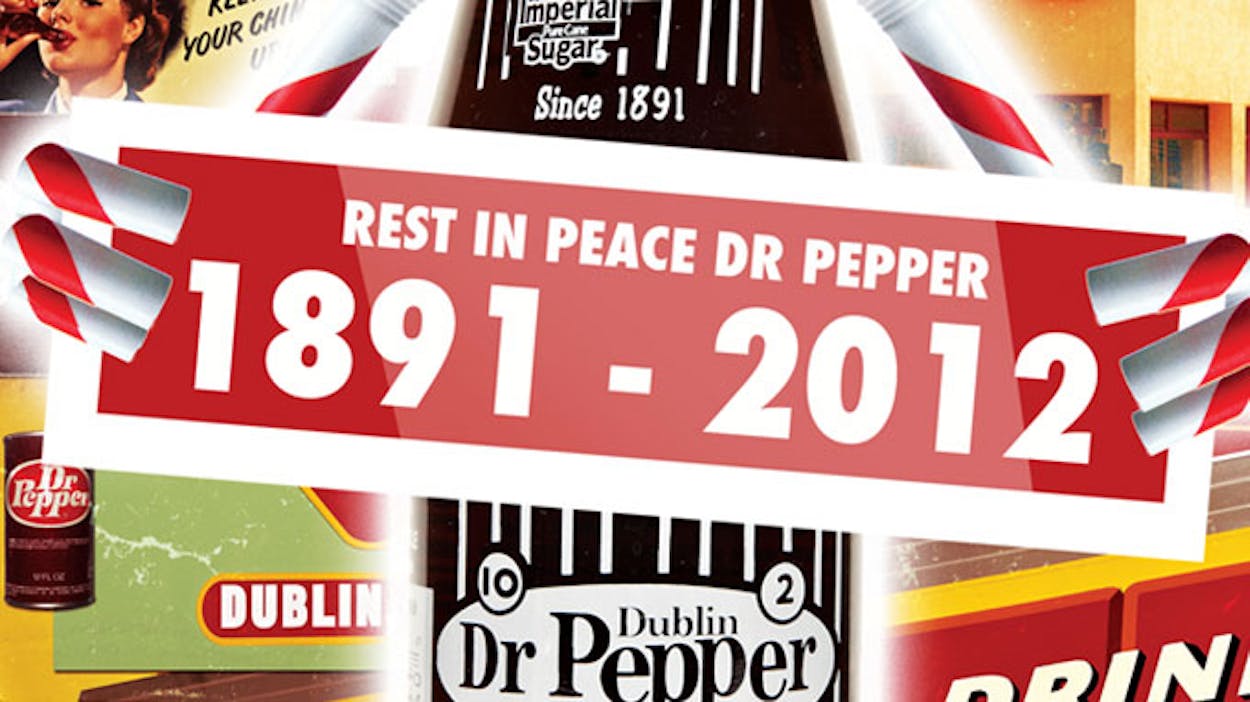 Dublin Dr Pepper, the iconic Texas soft drink that remained loyal to its original formula until the final bottle, died on January 11, in Plano. It was 120 years old.
Dublin Dr Pepper, the iconic Texas soft drink that remained loyal to its original formula until the final bottle, died on January 11, in Plano. It was 120 years old.
The cause was the settlement of litigation related to trademark and distribution rights, according to a statement released by the Dr Pepper Snapple Group, which is based in Plano. Longtime fans of the drink disagreed, citing the cause as corporate stupidity.
The soda had enjoyed a cultlike following for decades, in part because of its adherence to tradition. It was produced in Dublin with vintage bottling equipment and sweetened with Imperial Pure Cane Sugar. After the beverage industry began to transition to high-fructose corn syrup in the seventies, Dublin Dr Pepper’s continued use of cane sugar distinguished the brand. Loyalists were known to refer to the beverage as “the Drink,” “a Dublin,” or “the nectar of the gods.”
Dublin Dr Pepper was born in 1891, when local businessman Sam Houston Prim visited Waco, where Charles Alderton had invented the fizzy, fruity concoction with 23 secret flavors six years earlier. Prim was hooked the moment the first drop touched his lips. He began producing the drink at his plant, known as Dublin Bottling Works; it was later renamed the Dr Pepper Bottling Company. In the thirties, Prim employed a fourteen-year-old named Bill Kloster, who started out as a sorter for 10 cents an hour. Kloster worked his way up to production manager, then general manager, and he eventually took over the operation from the Prim family, in 1991. “My grandfather loved everything about the job,” says Jeff Kloster, who now owns the facility with his father, W. E. Kloster. “And so did I. I began working at the plant at the age of ten, inspecting the returnable bottles after they came out of the washer.”
Over time, the word “Dublin” began to signify to aficionados of Dr Pepper what “prime” means to lovers of red meat. And in an age of aluminum and plastic, the graceful glass bottles stood out on store shelves, proudly displaying their distinctive vertical lines and the Imperial Sugar logo. Texans used the beverage in recipes for homemade chocolate cakes and sauces, and it appeared in dishes served at fancy restaurants, such as the Dublin Dr Pepper–braised short ribs at Fearing’s, in Dallas.
Meanwhile, Dr Pepper was changing hands at the corporate level. It was purchased by Cadbury Schweppes, in 1995, before becoming Dr Pepper Snapple Group, in 2008. And though it began to buy out other independent bottlers around the country, the company allowed Dublin to continue selling its product in a six-county territory in Central Texas as part of a long-standing agreement.
But as Dublin bottles began to appear in stores outside the prescribed distribution area and sales on the Internet took off, Dr Pepper Snapple started to worry that the success of Dublin Dr Pepper would dilute the brand. The company also recognized an opportunity to increase its own revenue through the niche market of cane-sugar-sweetened drinks.
Dr Pepper Snapple sued the Dr Pepper Bottling Company in federal court last June, claiming that the bottler had violated the distribution agreement and infringed on its trademark. Dublin filed a countersuit in August, noting that the Dr Pepper brand had long supported Dublin’s efforts. (Kloster can’t confirm specific numbers because of a confidentiality agreement, though he acknowledged, “We sold a whole hell of a lot of Dr Pepper.”) In the end, a settlement was reached in which Dr Pepper Snapple bought out the company and ended the relationship, leading to the soda’s demise.
“I don’t know that we were really prepared for the end,” says Karen Wright, the author of The Road to Dr Pepper, Texas and executive director of the Dublin Economic Development Corporation. “I responded with tears, accompanied by moans and groans. It was a stunner.”
“The reality of it was overwhelming, but everyone seems to be moving forward,” Kloster says. “Having grown up drinking Dr Pepper, I’m not going to sit here and lie to you and tell you that I’ll never drink another one. That would be a bald-faced lie.”
Prominent Dr Pepper drinkers Dr. J and Dr. Dre could not be reached for comment. In addition to Dublin Bottling Works, which continues to make beverages like Triple XXX Root Beer with pure cane sugar, Dublin Dr Pepper is survived by the Twitter hashtag #boycottdrpepper.








